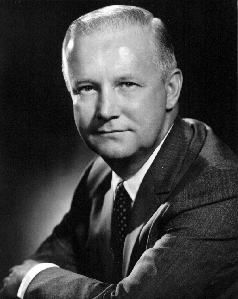


Arch Alfred Moore, Jr. was born in Moundsville, Marshall County, the grandson of the city's mayor F. T. Moore. After attending Lafayette College and West Virginia University, he joined the family law firm in Moundsville. As an Army combat sergeant in World War II, Moore earned a bronze star and purple heart. He served one term in the House of Delegates before being defeated for the United States House of Representatives in 1954. He was elected to Congress two years later and remained there until becoming governor in 1969.
With the passage of the Governor's Succession Amendment in 1970, Moore became the first governor to succeed himself since 1872. The 1968 Modern Budget Amendment also gave him more budgetary powers than any previous governor. Moore presided over the establishment of the Department of Highways and the construction of modern interstate systems, begun during the administration of Governor Cecil Underwood. The Board of Regents was created to manage all state colleges and universities. Other accomplishments of his first term included designation of "black lung" as a coal mining disease and the development of public kindergartens. Moore interceded in labor activities, firing striking road maintenance workers and Charleston transit workers, and helped negotiate an end to a national coal strike.
On February 26, 1972, an earthen dam broke on Buffalo Creek, unleashing 135 million gallons of water, near the community of Man, Logan County. The resulting flood killed 125 people and 4,000 lost their homes and possessions. Investigators determined illegal surface mining practices to be the cause of the disaster. In one class action suit, Pittston Coal Company paid $13.5 million to flood survivors, who each received approximately $13,000 after legal costs. Although the state sued the coal company for $100 million, Governor Moore negotiated a $1 million settlement, while the state eventually paid the federal government $9.5 million in clean-up costs and interest.
During Moore's second term, new state medical schools were established in Lewisburg and at Marshall University in Huntington. One of his pet projects was the West Virginia Science and Culture Center on the State Capitol Complex.
In 1975, Moore and his campaign manager were indicted for extortion, the first seated governor to be officially charged with a crime. Both were found not guilty.
After leaving office, Moore established private law practices in Charleston, Moundsville, and Washington, D.C. He was defeated for the United States Senate in 1978 and for governor in 1980. In 1984, he defeated Democrat Clyde See to become the first governor elected to three four-year terms.
At the beginning of Moore's third term, West Virginia had the highest unemployment rate in the nation due to a recession in the coal industry. Moore expanded corporate tax credits to attract businesses to the state. In addition, the legislature reduced the amount coal companies were required to pay into workers' compensation.
In 1988, he was defeated in his re-election bid against Democrat Gaston Caperton. In 1990, Moore was found guilty of mail fraud. He served over two years in federal prison and paid a settlement.
He died on January 7, 2015.